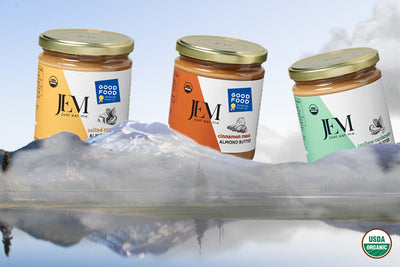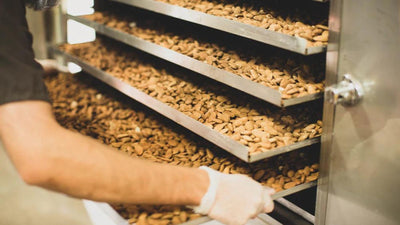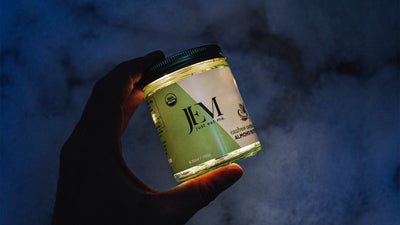2021 has finally arrived! Hooray! We hope things get better from here. Since it’s a New Year it’s time for new year’s resolutions. After what we’ve been through in 2020, everyone is much more aware and sensitive about their health. And good health starts with healthy eating. So...as you plan those resolutions, take our suggestion and increase the amount of organic foods in your diet. Why should you buy organic? We know it’s more expensive, but there are more benefits than most people are aware of. We, the JEM team, want to provide you with a few fun facts on what USDA Certified Organic really means and help you start adding some organic products to your shopping cart.
Fact #1:
As a USDA Certified Organic product, you are a part of the most heavily regulated and closely monitored food production system in the US.
That’s right! If you see the USDA Certified Organic seal on a product, you know that product and its producer have been subject to a rigorous review. This review begins with how and where ingredients were grown and follows through all the way through sourcing, production, labeling/packaging to the finished product that you see in store or online. Each step of the way, organic certifiers, such as Oregon Tilth, have oversight of the process to assure you each Certified Organic product has the cleanest, healthiest ingredients and the best possible production processes. Only the “USDA Certified Organic” label, unlike other eco-labels such as ‘natural,’ ensures that products are grown and processed without toxic chemicals, antibiotics, synthetic hormones, pesticides, etc.


Fact #2
Organic farms help combat climate change by maintaining healthy soils and reducing carbon emissions.
How do you build healthy soil? By using compost, crop rotation and other natural tools instead of relying on synthetic pesticides and fertilizers. These unnatural tools deplete the soil of its valuable nutrients and also cause runoff into our lakes, rivers, oceans and drinking water. Healthy soil, on the other hand, reduces our carbon footprint by absorbing more carbon dioxide from the air.
Fact #3
Organic foods support good health and safety!
Eating organic provides you with more fatty acids, minerals, antioxidants and vitamins, such as iron, magnesium, and vitamin C, which are all crucial to maintaining good health. Other non-organic food contain harmful hormones and pesticides that, by nature, are designed to kill. Long term effects of these harmful toxins can cause serious health issues.
Fact #4
Organic farmers support biodiversity.
A healthy and balanced ecosystem is extremely important for all Earth’s inhabitants. Organic agriculture uses practices to preserve the natural habits of animals and plant growth. Unnatural practices can be detrimental to the long-term well-being of our ecosystem. When the natural resources that animals depend on, such as plants and water, are contaminated many will inevitably suffer.
Fact #5
This is how much food should truly cost.
Yes, buying organic is usually more expensive, but think of it this way. Organic is how we should be consuming food, all-natural. The price reflects how much food production truly costs. Non-Organic farmers use unethical practices, cheap toxic pesticides and unnatural preservatives in order to get into your shopping cart at a reduced price. Read the labels and see what’s really in that non-organic product.
Fact #6
Organic foods are fresher and therefore have more flavor.
Organic foods don’t use artificial preservatives or fake chemical flavors. This means each bite is truer, fresher and the taste of the product always shines through. In addition, the producers who are focused on organic products generally care more about you and what you eat. That’s why they've focused their business on making products that are cleaner and healthier. It’s hard work and dedication, but we and other organic producers think it’s important and you should too.
Hopefully these fun facts have educated you a bit about what it means to be USDA Certified Organic. We hope these facts will not only make you more aware of the differences between organic and non-organic next time you shop for food, but cause you to put a couple more organic products in your shopping car this year. Make one of them JEM Organics Nut Butters!







